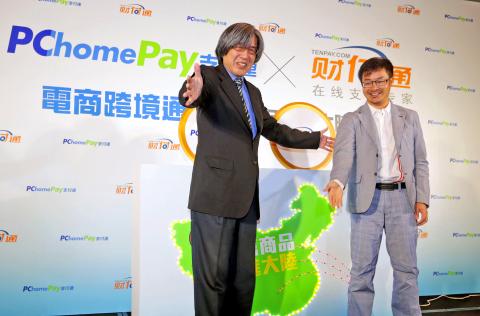PChomePay Inc (支付連), a subsidiary of PChome Store Inc (商店街市集) tapping the third-party electronic payment business, yesterday announced plans to team up with Chinese Internet services company Tencent Holdings Ltd (騰訊) to launch a service for cross-border e-commerce transactions in China.
Through integration of the systems of PChomePay and TenPay Co (財付通) — a payment provider owned by Tencent Holdings — Chinese consumers would be able to directly purchase products from the 18,000 PChome Store shops online.
This is the second significant cooperation between Taiwanese and Chinese third-party payment services, following Allpay Financial Information Service Co Ltd (歐付寶) of MacroWell OMG Digital Entertainment Co (OMG, 茂為歐買尬數位科技) which teamed up with Alibaba Group Holding Ltd’s (阿里巴巴) Alipay.com Co (支付寶) in the second half of last year.

Photo: CNA
“The cooperation with TenPay is an important step toward the development of cross-strait e-commerce transactions, which only applies to PChome Store, but will surely be expanded,” Jan Hung-tze (詹宏志), chairman of PChomePay and PChome Store, told a press conference in Taipei.
Jan said he is targeting a monthly sum of NT$1 billion (US$32.89 million) from China through the launch of the new service, which might help raise sales momentum for PChome Store.
Taiwan-based Shanghai Commercial & Savings Bank (上海商業儲蓄銀行) is scheduled to serve as the bank for the newly launched service, with PChomePay retaining payments from consumers by up to 15 days before sending them to online shops.
PChome Store has also unveiled products especially for Chinese consumers, offering Taiwanese souvenirs, gift boxes and skincare products, aiming to stimulate sales from China.
Tenpay currently has 300 million individual members and 500,000 corporate members, serving as one of the leading third-party payment services in China.
In the first nine months of the year, PChome Store’s consolidated sales totaled NT$710.78 million, up 43.59 percent from the same period last year.
Its shares fell 2.41 percent to NT$182.5 on the GRETAI Securities Market yesterday, compared with a decline of 0.53 percent on the over-the-counter benchmark index.

SEEKING CLARITY: Washington should not adopt measures that create uncertainties for ‘existing semiconductor investments,’ TSMC said referring to its US$165 billion in the US Taiwan Semiconductor Manufacturing Co (TSMC, 台積電) told the US that any future tariffs on Taiwanese semiconductors could reduce demand for chips and derail its pledge to increase its investment in Arizona. “New import restrictions could jeopardize current US leadership in the competitive technology industry and create uncertainties for many committed semiconductor capital projects in the US, including TSMC Arizona’s significant investment plan in Phoenix,” the chipmaker wrote in a letter to the US Department of Commerce. TSMC issued the warning in response to a solicitation for comments by the department on a possible tariff on semiconductor imports by US President Donald Trump’s

‘FAILED EXPORT CONTROLS’: Jensen Huang said that Washington should maximize the speed of AI diffusion, because not doing so would give competitors an advantage Nvidia Corp cofounder and chief executive officer Jensen Huang (黃仁勳) yesterday criticized the US government’s restrictions on exports of artificial intelligence (AI) chips to China, saying that the policy was a failure and would only spur China to accelerate AI development. The export controls gave China the spirit, motivation and government support to accelerate AI development, Huang told reporters at the Computex trade show in Taipei. The competition in China is already intense, given its strong software capabilities, extensive technology ecosystems and work efficiency, he said. “All in all, the export controls were a failure. The facts would suggest it,” he said. “The US

The government has launched a three-pronged strategy to attract local and international talent, aiming to position Taiwan as a new global hub following Nvidia Corp’s announcement that it has chosen Taipei as the site of its Taiwan headquarters. Nvidia cofounder and CEO Jensen Huang (黃仁勳) on Monday last week announced during his keynote speech at the Computex trade show in Taipei that the Nvidia Constellation, the company’s planned Taiwan headquarters, would be located in the Beitou-Shilin Technology Park (北投士林科技園區) in Taipei. Huang’s decision to establish a base in Taiwan is “primarily due to Taiwan’s talent pool and its strength in the semiconductor

French President Emmanuel Macron has expressed gratitude to Hon Hai Precision Industry Co (鴻海精密) for its plan to invest approximately 250 million euros (US$278 million) in a joint venture in France focused on the semiconductor and space industries. On his official X account on Tuesday, Macron thanked Hon Hai, also known globally as Foxconn Technology Group (富士康科技集團), for its investment projects announced at Choose France, a flagship economic summit held on Monday to attract foreign investment. In the post, Macron included a GIF displaying the national flag of the Republic of China (Taiwan), as he did for other foreign investors, including China-based